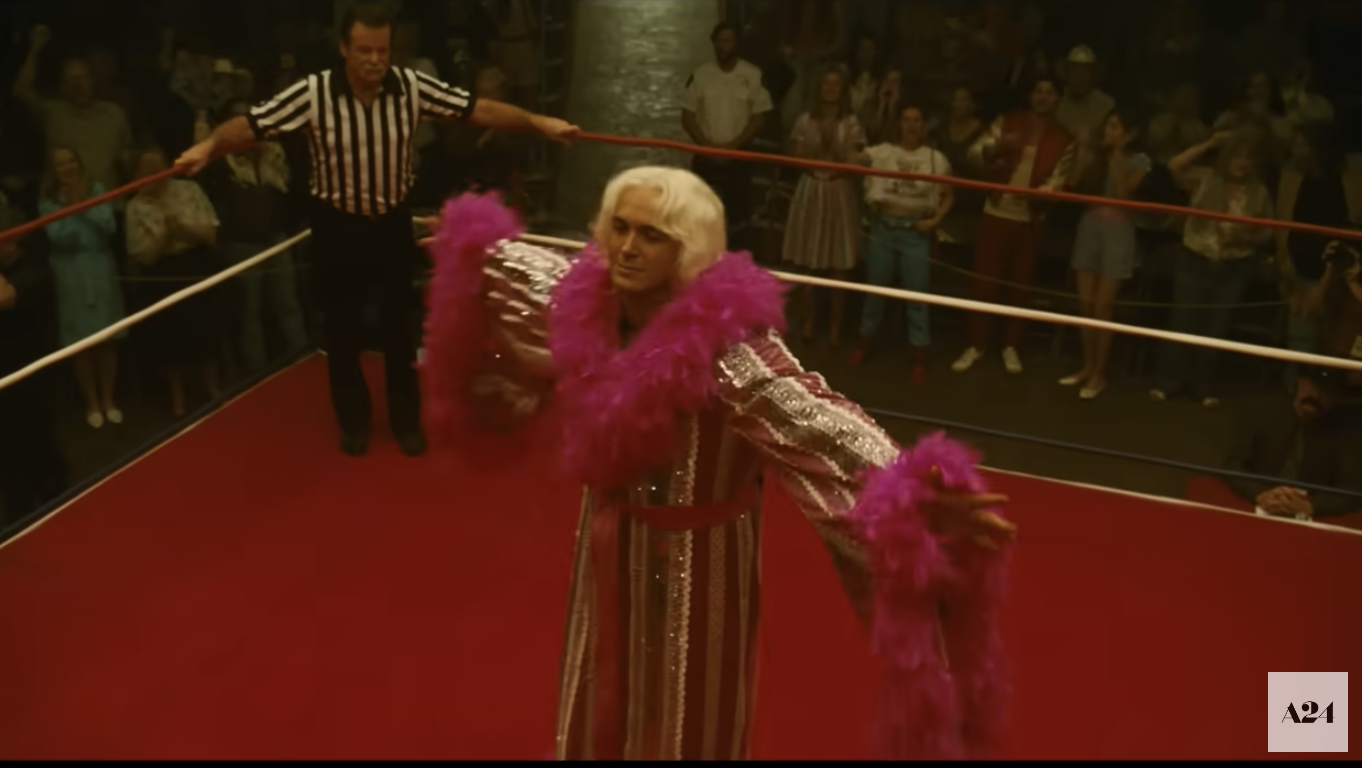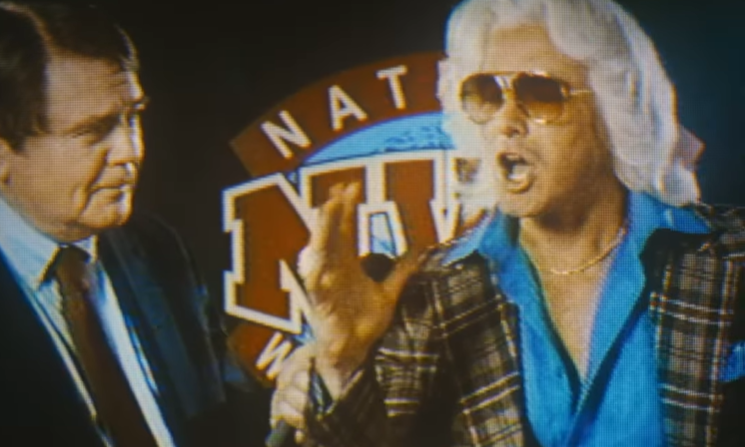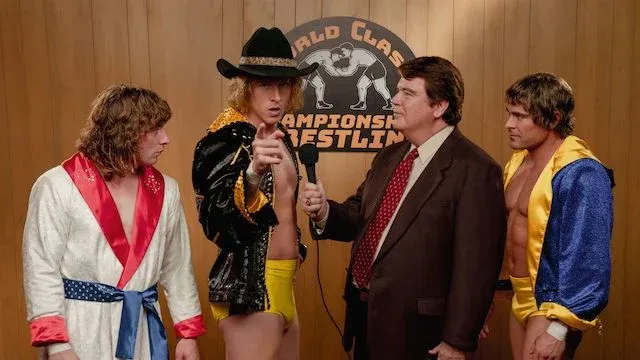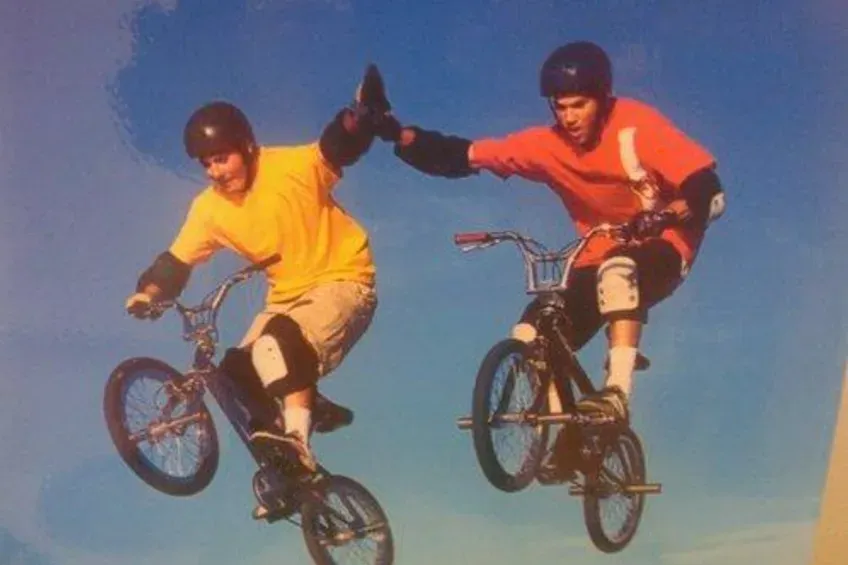This May Be The Last Time.
This May Be The Last Time.
The Iron Claw and Doubling Down
I heard people whisper "Jesus" at different points, from different places in the theater, as I watched The Iron Claw two or three weeks ago. If you've taken in much about wrestling history, this is one of the big stories you're made familiar with, like the Montreal Screwjob or Vince McMahon's consolidation of power or, I guess now, Hulk Hogan's racist sex tape. The Iron Claw deaths were all inevitabilities to me, the way they would have been for anybody watching the adaptation of the first Jeffrey Eugenides book, still titled "The Virgin Suicides" when it hit theaters. There is just no question that you are buying a ticket to a movie about people dying. The story of the Von Erichs is that one wrestling family had six sons and five died young; their name means tragedy. I wonder if the things we were watching in The Iron Claw hit some of the people around me harder, unaware as they may have been that everybody on screen was fucked from the moment we saw them.
This is not to say I was unmoved. I thought it was terrific. I had issues with the film, namely that I think it's wrong to excise Chris Von Erich from the story, even if it's fictionalized, even if you're already pushing two-and-a-half hours. I don't think you make this movie if you can't find a way to include everybody.

At the same time, the film, to my mind, belonged to Holt McCallany's Fritz and Maura Tierney's Doris Von Erich. The parents dominate every scene they're in and every scene they aren't in and the four surviving-for-a-time Von Erich brothers are stuck trying to make a claim on whatever space they can.
Zac Efron, bruised and massive, looking like Grimace, moving like his skin is made of the hard rubber of Michael Keaton's Batman costume, has a can't-lose role as the stoic Kevin Von Erich. Even if he just stood there, he'd succeed in appearing pained. That he does a great job is a bonus, and I can't help but root for him to win a few awards, if only to provide the justification he would want for having (most likely) taken recreational steroids.
Writer-director Sean Durkin has made interesting choices in what he doesn't show the audience in his past features and I felt he went a little overboard here. That we do not see David once he's left for Tokyo, that we do not see Kerry's big fight with Ric Flair, that we do not see his accident and recovery, made these things feel less real. There's too little of every brother but Efron's Kevin. You could read the turning away from trauma as an extension of the film's insights on repression: We don't see Kerry wipe out on his motorcycle, almost lose his foot, start walking on it too soon and then actually lose his foot because every Von Erich was pretending they still had a dominating superstar in their corner, and acknowledging the setback would make it real. But that Ric Flair fight was a win, the culmination of so much of what Fritz and his sons wanted. It seems obvious, from the outside, with zero conception of how this film was made and what it was like to raise the money for it, that a miniseries would have been the best way to tell this story, if only so the missing parts were clearly missing for storytelling reasons and not because it's impossible to fully communicate seven lives in 132 minutes.
The decision to get right up to the edge of the Kerry/Ric Flair fight and then skip past it is, ultimately, worth it for how much the film's best scene benefits from also being Flair's on-screen introduction. When we finally see Flair, played by Aaron Dean Eisenberg, two of the film's four primary Von Erich brothers are dead and a third, the one who beat Flair in an earlier fight, has had one of his feet amputated. The curse has made Kevin the only Von Erich capable of wrestling Flair for the belt and he feels that weight.Durkin begins the sequence with a promo and Flair is lightning, throwing out his signature "Woo!" yell between describing his two-block-long limousine and the 25 women waiting for him in it. Some wrestling fans seem to think the Eisenberg's Flair performance is the worst part of the film, but Flair is a cartoon character and Eisenberg hits the Bugs Bunny persona beautifully, strutting around and bugging his eyes out and having fun. Given that the real Ric Flair is a racist who was sued by a woman after allegedly forcing her to touch his penis (the matter was settled out of court), this is a very kind impression of the man.
The match starts and ends quickly, with Kevin, dead-eyed, holding Flair in the Von Erich family's signature move until the ref disqualifies him. You've seen men dropkick each other and jump off the top ropes by this point, but in what I believe is the film's longest match, Kevin just squeezes his opponent's head like his body is a pneumatic press. No flamboyance, no playing to the crowd.
Backstage, Fritz and Kerry denigrate Kevin. He blew it. Threw a big chance away for nothing. Flair comes in, blood staining his white hair, and commends Kevin. He cracks a beer, says the fight looked amazing and offers to go party with the Von Erichs. They decline and Kevin laughs, unbelieving.

He laughs because he's being complimented by his opponent, a man he seemed to seriously hurt after disregarding any plans the two had made before their match, as his brother and father look at him with disgust. He could also be laughing, though the movie does not make this explicit, because he's realized Flair has a bugfuck charisma that he'll never be able to copy, and that he can't hurt Flair if he tries. Kevin's family has been preparing for the wrong game. A few of the brothers may have gone over, but they're approaching professional wrestling as athleticism, while Flair is human neon. Eisenberg's energy is so different from Efron's here that you can't really imagine Kevin being able to adapt to Flair's style, even if he recognizes the gulf between the way the two men are received by the wider world. Kevin is a Virtua Fighter character and Ric is Street Fighter's Blanka.
In many ways, The Iron Claw's Ric Flair sequence reminded me of the Bob Dylan scene from Inside Llewyn Davis. At the end of that film, Oscar Isaac's title character leaves a performance and catches a few moments of a very young Dylan playing "Farewell," a song almost identical to Davis' "Fare Thee Well," the closest thing he's had to a hit. Davis' expression is hard to read, but we know that Dylan is a tidal wave. Whatever happens to the fictional Llewyn Davis, in our world, the real Bob Dylan becomes one of the most renowned songwriters of all time. Davis is already a footnote in the Greenwich Village folk scene and he's doomed to be overshadowed further as Dylan establishes himself. Inside Llewyn Davis takes place in 1961 and Bob Dylan released his first album in 1962. It's a sort of asynchronous Mozart/Salieri relationship. If Davis retires, as the movie implies he might, he does so as a new kind of figure comes in to make him irrelevant anyway.
Flair is also a tidal wave, a once-in-a-lifetime figure in wrestling who connected with fans in a way none of the Von Erichs could. In a world that produces Ric Flairs, Fritz Von Erich will always have to take on a Salieri role.
I've liked all of Durkin's work that I've seen (and hope his old Borderline co-founder Josh Mond returns to movies some day) and especially appreciated his last film, The Nest. In that story, Jude Law's Rory moved his family from New York City to London in pursuit of a big financial break. Rory buys a mansion in the country as an investment and lives outside of his means to impress his co-workers and would-be clients, which frustrates his wife, Allison, played by Carrie Coon, more and more as she realizes how far in the hole they are. Rory buys a horse, hires people to build a stable and attends high society parties, pretending to be a-okay as Allison makes sacrifices to keep up appearances for the man ruining her life. It's honestly difficult to think about a movie that painful for too long.
The heart of The Nest is Rory's decision to double down whenever faced with an obstacle, because if he and his family can fix the mansion up, they'll be able to sell it for a big profit, and if the big moves he makes at his day job work, he'll actually be part of the social class he's peeking in on. You can look back at the beginning of the film and think "Things would be so much better if he hadn't moved his family to England and bought that mansion" and then you can think "Well, even if he did that, he could have salvaged things if he'd held off on buying the horse and stable," and so on. The story covers a string of bad decisions, each completely avoidable, but the decisions are made because if one of them had worked out, it could have theoretically made up for every other mistake.
As The Iron Claw begins, Fritz has surprised his wife Doris with a nice rented Cadillac to tow the family's mobile home around, reasoning that the first step in making it big is feigning already being there. From there, his sons' lives are double down bets. If Kerry makes it to the Olympics, the family will get fame and fortune. That doesn't work out, but if David goes to Tokyo and becomes a superstar, the Von Erich name will be more prominent in wrestling than ever. And then Mike and then Kerry and then all but Kevin's physical form.

The cock rock of the late-70s and early-80s is some of the worst music in the world, but it immediately evokes a time and a place and a certain strain of toxic masculinity and Durkin, early in his film, has Mike Von Erich play an original song with his band at a college party. The song, "Live That Way Forever," was actually written by Richard Reed Parry (of the now disgraced Arcade Fire) and Laurel Sprengelmeyer (who performs as Little Scream). The song rules. When it plays over the end credits, as much as it's a pastiche of better songs that Springsteen wrote for Born in the USA, it gave me a jolt. It's entirely implicit, but in the reality of The Iron Claw, Mike already cultivated these songwriting chops as a teenager and could have, if his father hadn't discouraged his passion for music, had a great career there. And so it isn't even that the doubling down didn't work, it's that it sidelined other, potentially more fulfilling interests. It hurts.
Doubling down is always hard to watch or read about. Sometimes it’s literal: I think about Gary Bond playing two-up with Donald Pleasance in Wake in Fright or Robert Patrick's arc on The Sopranos. Often it’s just any sweaty rationalization that one can get out of the hole by temporarily digging in a little deeper, with no guarantee that it'll actually be temporary. It’s all over the Coen brothers’ work. Robert Bresson's, too. It’s one of the scariest things you can put in a story because it’s an admission that the exit may be false. There may be no way out. Maybe you will always be where you are. Maybe you will never transcend. Some risks not only don’t pay off, they explode in your face. You can work hard your entire life and still die poor and if you recognize that and try to take a shortcut, it can fail and you can still die poor.
I suppose that’s the difference between doubling down and simply being obsessed— fiction often rewards obsession. Obsession is saying “I’ll get through, no matter how many more times I have to try.” Doubling down is saying “I just need one more chance and then it’ll work out and we’ll all be more comfortable.” One more time. One more time. This is the wrestling match that makes everything worth it. This is the gamble whose winnings make back everything lost in the previous gambles. One more time. This is the last time, I promise.
It’s so often done in the face of a Ric Flair or an English mansion— these monumental things and people and ideas you can’t conquer. It's "the house always wins." It’s not just that you’re going deeper in the hole, it’s that to get out, you’d have to pull off a miracle. You would have to go to sleep a popular mercenary wrestler and wake up a firecracker of charisma.
So many problems in my life exist because I didn’t risk anything. I didn’t bet on myself, didn’t stick my neck out. A story like this says “maybe that would have fucked you even harder.” I would like to think that I don’t fear failure as much as I fear inaction. The cost of doing something and falling on my face is small, and I usually appreciate, in retrospect, that I made the effort. The experience is almost always of value in and of itself. But I’ve also doubled down, especially in recent years. It hasn’t paid off. And I’ll probably do it again. Success and the promise of peace of mind are too alluring.
What's important here, in The Iron Claw, though, is that we only see Fritz Von Erich double down on himself once. He rents a Cadillac that he can't pay for in the movie's first scene, and then the next time we see him, he owns a house and runs a wrestling promotion. It worked. Every other time he bets big, he's doing it with somebody else's life. Moreover, he's doing it with his children's lives. That's abusive. That's warmongering politician stuff, "you go in first and make sure the fire isn't too hot" stuff, and that I cannot do. When you have built up significant enough relationships with people who rely on you, the option to double down on yourself is no longer an option. If I lose too much money, I am actively hurting my partner and child.
I'm still trying to find the amount I am capable of risking, the extent to which I can fail without taking my family with me. If I was single and 34, I could piss away a lot more than I'm pissing away right now. The required restraint isn't hard– I love my family too much for it to be. Fritz Von Erich was a busted human being if he didn't realize his kids' lives were more important than his personal goals. But. Again. I understand the need to keep betting and the lie that a couple more bets will turn everything around. I can see the mirage in the distance, too. And I am grateful for the part of my brain that prioritizes people over ambition, because I know full well I could never beat Ric Flair.
